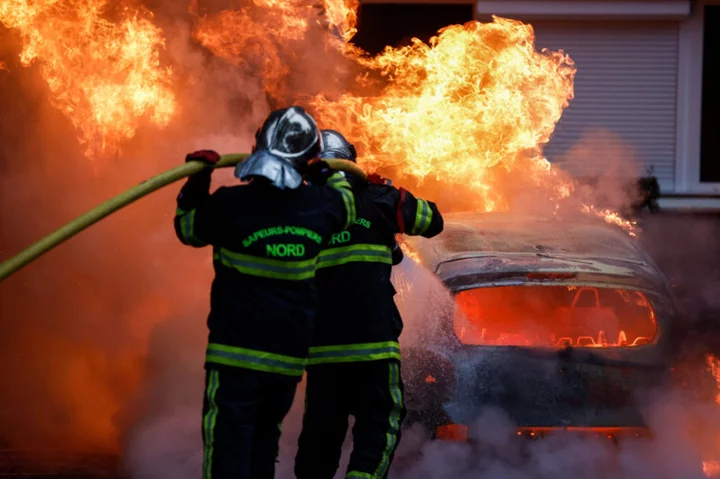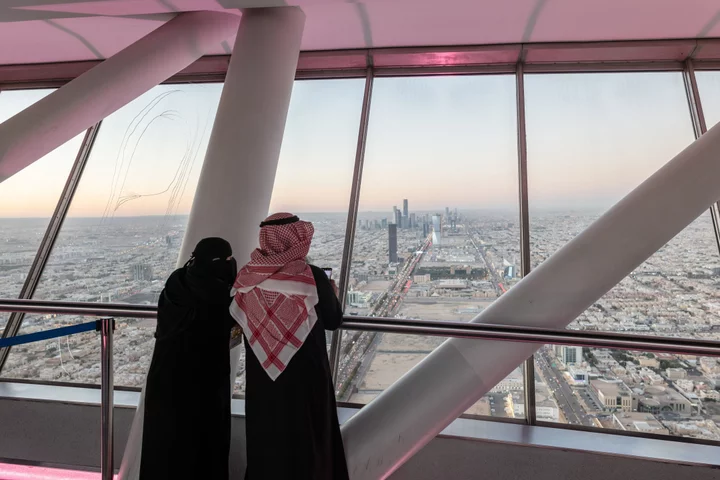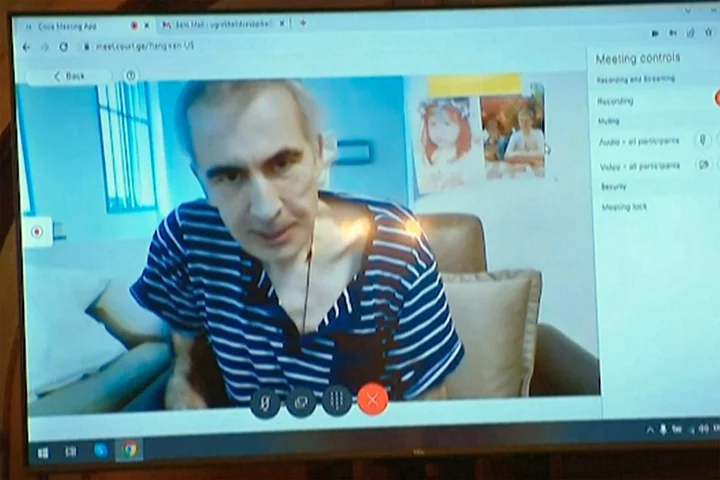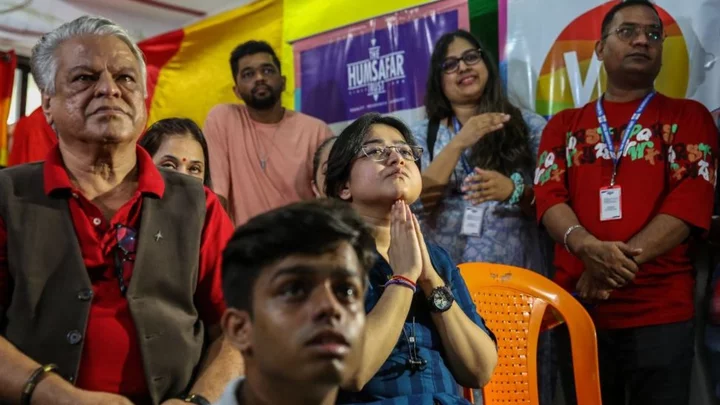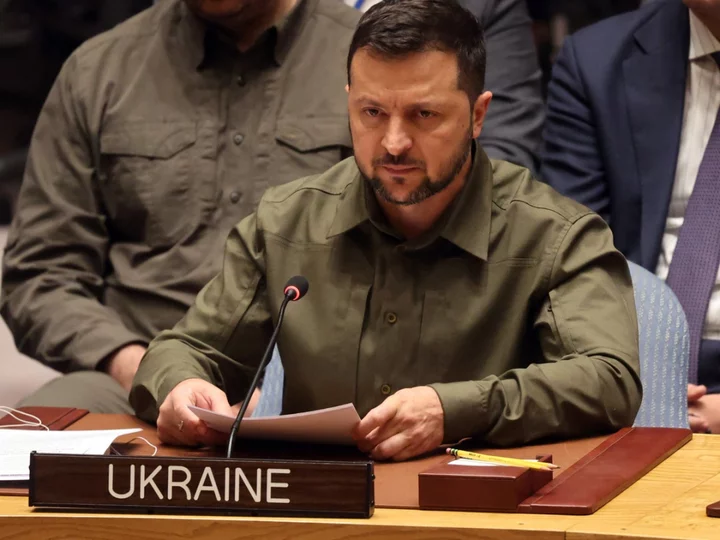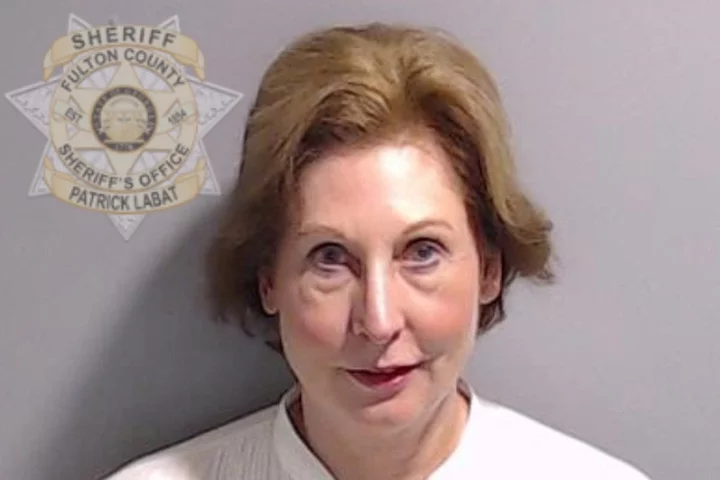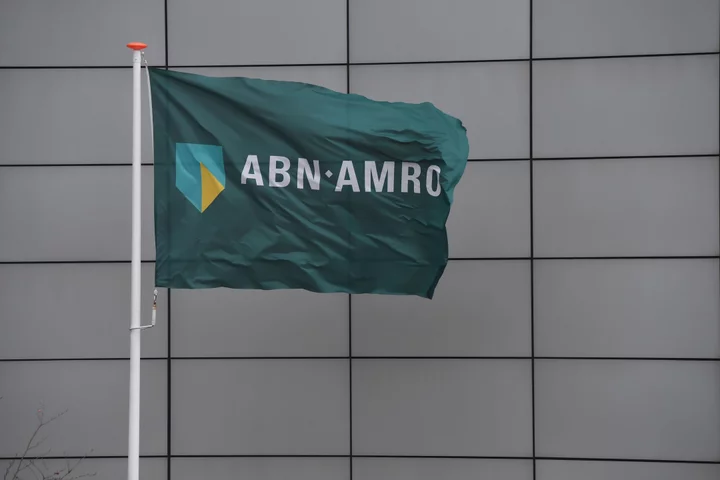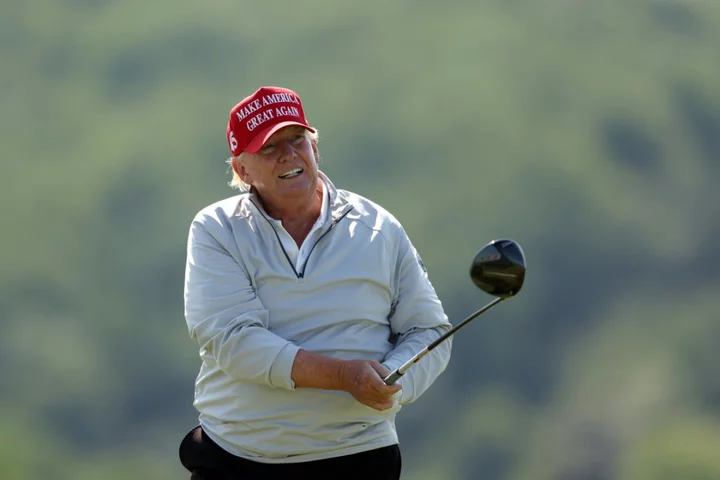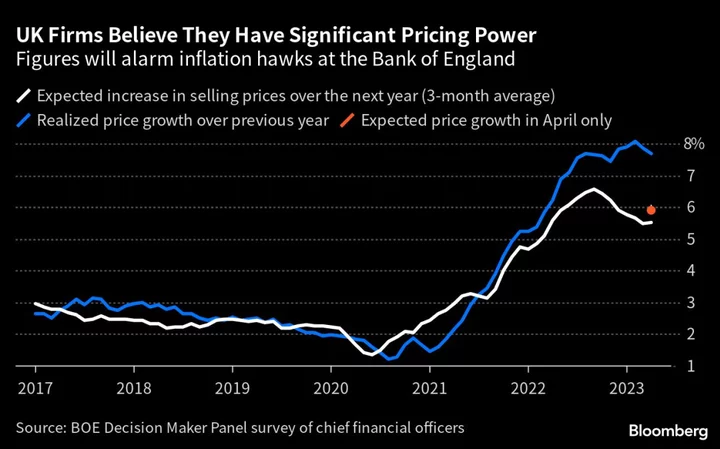France’s President Emmanuel Macron is chairing a crisis meeting of senior ministers in the wake of a second night of rioting following the police killing of a 17-year-old boy, identified as Nahel, in the Paris suburb of Nanterre. There were 150 arrests across the country into Thursday. Police and firefighters struggled to contain protesters and extinguish numerous blazes through the night that damaged schools, police stations and town halls or other public buildings, according to a spokesperson for the national police. Authorities also re fires or skirmishes in multiple cities overnight, from Toulouse in the south to Lille in the north – although the nexus remained Nanterre and the surrounding areas. What happened during the shooting? The 17-year-old, identified as Nahel, was driving a car on Tuesday morning when he was pulled over for breaking traffic rules, prosecutors said. The teenager was too young to hold a full driving license in France. Police initially reported that one officer had shot at the teenager because he was driving his car towards him. But this version of events was quickly contradicted by a video circulating on social media. On Thursday, The Nanterre prosecutor said that witness statements, CCTV video footage, amateur video footage, and statements from police offers were being used to piece together the timeline of events from Tuesday morning. Pascal Prache confirmed that two motorcycle police noticed a Mercedes, with one young driver and two passengers travelling quickly in a bus lane at 7:55am on Tuesday. Police twice attempted to indicate to the car to pull over and park, but the driver continued driving and the two police pursued the vehicle. The Mercedes had to stop at a at a traffic light, at which point the police asked the driver to turn off engine and exit the vehicle. The police officers said they drew their weapons and aimed them at the driver to stop him from taking off in the vehicle. However, the driver did pull away at which point the police decided to shoot. A bullet hit the driver through arm and chest, and the car crashed. One of the passengers fled. Firefighters were called to the scene at 8:21am. They provided first aid to the driver which was unsuccessful. The officer who fired a single shot said he wanted to prevent the car from leaving and because he feared someone may be hit by the car, including himself or his colleague, according to Mr Prache. The police officer is being investigated for voluntary homicide for shooting Nahel. Based on an initial investigation, the prosector Mr Prache said, he concluded that "the conditions for the legal use of the weapon were not met." How did the riots begin? Nahel was of North African descent. The incident has fed longstanding complaints of police violence and systemic racism inside law enforcement agencies from rights groups and within the ethnically diverse suburbs that ring major cities in France. Several people have died or sustained injuries at the hands of French police in recent years, prompting demands for more accountability. France also saw protests against racial profiling and other injustice in the wake of George Floyd’s killing by police in Minnesota. Tuesday’s killing was the third fatal shooting during traffic stops in France so far in 2023. Last year there were a record 13 such shootings, a spokesperson for the national police said. There were three such killings in 2021 and two in 2020, according to a Reuters tally, which shows the majority of victims since 2017 were Black or of Arab origin. Clashes first erupted Tuesday night in and around the Paris suburb of Nanterre, where Nahel was killed. Bins were set alight and some protesters threw fireworks at police. Officers used tear gas on the crowds. The government deployed 2,000 police to maintain order Wednesday. But violence resumed after dusk. How far have the riots spread? Police and firefighters struggled to contain protesters and extinguish numerous blazes through the night that damaged schools, police stations and town halls or other public buildings, according to a spokesperson for the national police. The national police on Thursday reported fires or skirmishes in multiple cities overnight, from Toulouse in the south to Lille in the north, though the nexus of tensions was Nanterre and other Paris suburbs. Police arrested 180 people around the country on Wednesday night, more than half of them in the Paris region. The interior minister, Gerald Darmanin, said 170 officers had been injured in the unrest but none of the injuries were life-threatening. The unrest has revived memories of riots in 2005 that convulsed France for three weeks and forced then-president Jacques Chirac to declare a state of emergency. That wave of violence erupted in the Paris suburb of Clichy-sous-Bois and spread across the country following the death of two young people electrocuted in a power substation as they hid from police. Two officers were acquitted in a trial ten years later. What has been the response from the government? President Emmanuel Macron held a crisis meeting with senior ministers over the shooting on Thursday morning and Mr Darmanin announced afterwards that 40,000 policemen would be deployed across the country, including 5,000 in the Paris region, on Thursday evening to put on end to the unrest. "The response of the state must be extremely firm," Mr Darmanin said. Both Darmanin and the prime minister, Elisabeth Borne, have ruled out declaring a state of emergency for now. On Wednesday, Mr Macron had said the shooting was unforgivable. As he convened his emergency meeting he also condemned the unrest. "The last few hours have been marked by scenes of violence against police stations but also schools and town halls, and thus institutions of the Republic and these scenes are wholly unjustifiable," he said. Reuters and the Associated Press contributed to this report Read More Who is Nahel M? The teen shot dead by police in France Fiery protests grip France for 3rd night over deadly police shooting of a teenager French suburbs are burning. How a teen's killing is focusing anger over police tactics ‘This is war’: France burns amid angry protests after teenager shot dead by police France’s highest administrative court says the soccer federation can ban headscarves in matches AP News Digest 3:15 am
France’s President Emmanuel Macron is chairing a crisis meeting of senior ministers in the wake of a second night of rioting following the police killing of a 17-year-old boy, identified as Nahel, in the Paris suburb of Nanterre.
There were 150 arrests across the country into Thursday. Police and firefighters struggled to contain protesters and extinguish numerous blazes through the night that damaged schools, police stations and town halls or other public buildings, according to a spokesperson for the national police.
Authorities also re fires or skirmishes in multiple cities overnight, from Toulouse in the south to Lille in the north – although the nexus remained Nanterre and the surrounding areas.
What happened during the shooting?
The 17-year-old, identified as Nahel, was driving a car on Tuesday morning when he was pulled over for breaking traffic rules, prosecutors said. The teenager was too young to hold a full driving license in France.
Police initially reported that one officer had shot at the teenager because he was driving his car towards him. But this version of events was quickly contradicted by a video circulating on social media.
On Thursday, The Nanterre prosecutor said that witness statements, CCTV video footage, amateur video footage, and statements from police offers were being used to piece together the timeline of events from Tuesday morning.
Pascal Prache confirmed that two motorcycle police noticed a Mercedes, with one young driver and two passengers travelling quickly in a bus lane at 7:55am on Tuesday.
Police twice attempted to indicate to the car to pull over and park, but the driver continued driving and the two police pursued the vehicle.
The Mercedes had to stop at a at a traffic light, at which point the police asked the driver to turn off engine and exit the vehicle.
The police officers said they drew their weapons and aimed them at the driver to stop him from taking off in the vehicle. However, the driver did pull away at which point the police decided to shoot.
A bullet hit the driver through arm and chest, and the car crashed. One of the passengers fled. Firefighters were called to the scene at 8:21am. They provided first aid to the driver which was unsuccessful.
The officer who fired a single shot said he wanted to prevent the car from leaving and because he feared someone may be hit by the car, including himself or his colleague, according to Mr Prache.
The police officer is being investigated for voluntary homicide for shooting Nahel.
Based on an initial investigation, the prosector Mr Prache said, he concluded that "the conditions for the legal use of the weapon were not met."
How did the riots begin?
Nahel was of North African descent. The incident has fed longstanding complaints of police violence and systemic racism inside law enforcement agencies from rights groups and within the ethnically diverse suburbs that ring major cities in France.
Several people have died or sustained injuries at the hands of French police in recent years, prompting demands for more accountability. France also saw protests against racial profiling and other injustice in the wake of George Floyd’s killing by police in Minnesota.
Tuesday’s killing was the third fatal shooting during traffic stops in France so far in 2023. Last year there were a record 13 such shootings, a spokesperson for the national police said.
There were three such killings in 2021 and two in 2020, according to a Reuters tally, which shows the majority of victims since 2017 were Black or of Arab origin.
Clashes first erupted Tuesday night in and around the Paris suburb of Nanterre, where Nahel was killed. Bins were set alight and some protesters threw fireworks at police. Officers used tear gas on the crowds. The government deployed 2,000 police to maintain order Wednesday. But violence resumed after dusk.
How far have the riots spread?
Police and firefighters struggled to contain protesters and extinguish numerous blazes through the night that damaged schools, police stations and town halls or other public buildings, according to a spokesperson for the national police.
The national police on Thursday reported fires or skirmishes in multiple cities overnight, from Toulouse in the south to Lille in the north, though the nexus of tensions was Nanterre and other Paris suburbs.
Police arrested 180 people around the country on Wednesday night, more than half of them in the Paris region. The interior minister, Gerald Darmanin, said 170 officers had been injured in the unrest but none of the injuries were life-threatening.
The unrest has revived memories of riots in 2005 that convulsed France for three weeks and forced then-president Jacques Chirac to declare a state of emergency.
That wave of violence erupted in the Paris suburb of Clichy-sous-Bois and spread across the country following the death of two young people electrocuted in a power substation as they hid from police.
Two officers were acquitted in a trial ten years later.
What has been the response from the government?
President Emmanuel Macron held a crisis meeting with senior ministers over the shooting on Thursday morning and Mr Darmanin announced afterwards that 40,000 policemen would be deployed across the country, including 5,000 in the Paris region, on Thursday evening to put on end to the unrest.
"The response of the state must be extremely firm," Mr Darmanin said.
Both Darmanin and the prime minister, Elisabeth Borne, have ruled out declaring a state of emergency for now.
On Wednesday, Mr Macron had said the shooting was unforgivable. As he convened his emergency meeting he also condemned the unrest.
"The last few hours have been marked by scenes of violence against police stations but also schools and town halls, and thus institutions of the Republic and these scenes are wholly unjustifiable," he said.
Reuters and the Associated Press contributed to this report
Read More
Who is Nahel M? The teen shot dead by police in France
Fiery protests grip France for 3rd night over deadly police shooting of a teenager
French suburbs are burning. How a teen's killing is focusing anger over police tactics
‘This is war’: France burns amid angry protests after teenager shot dead by police
France’s highest administrative court says the soccer federation can ban headscarves in matches
AP News Digest 3:15 am

